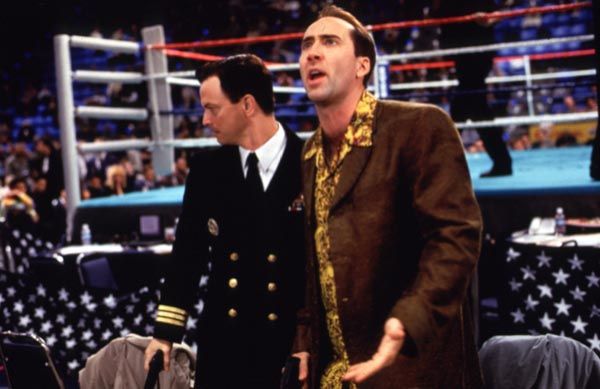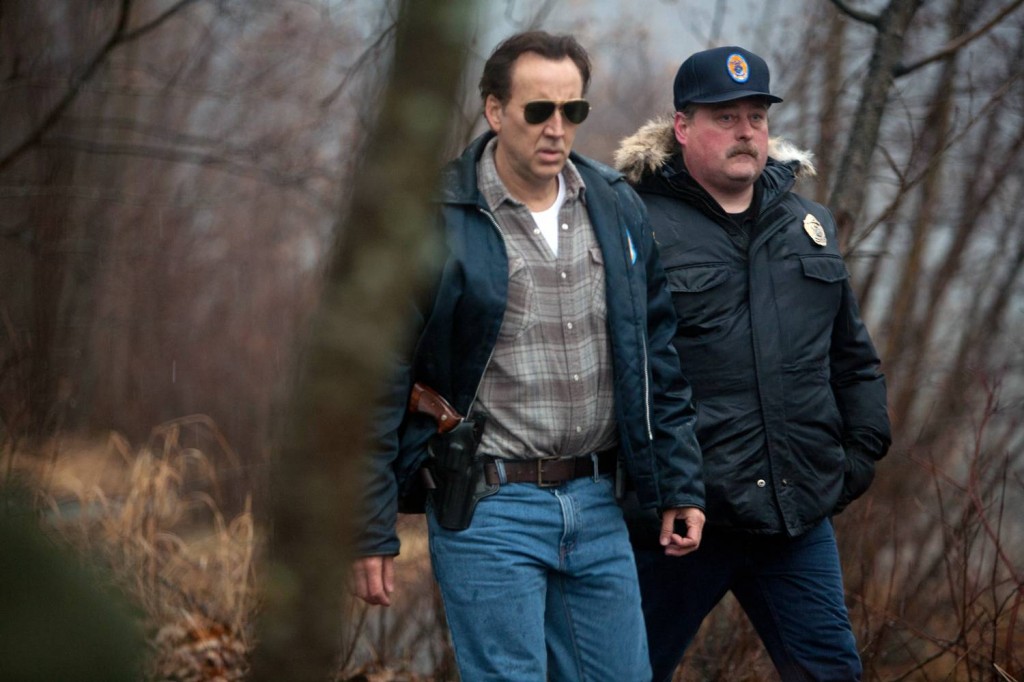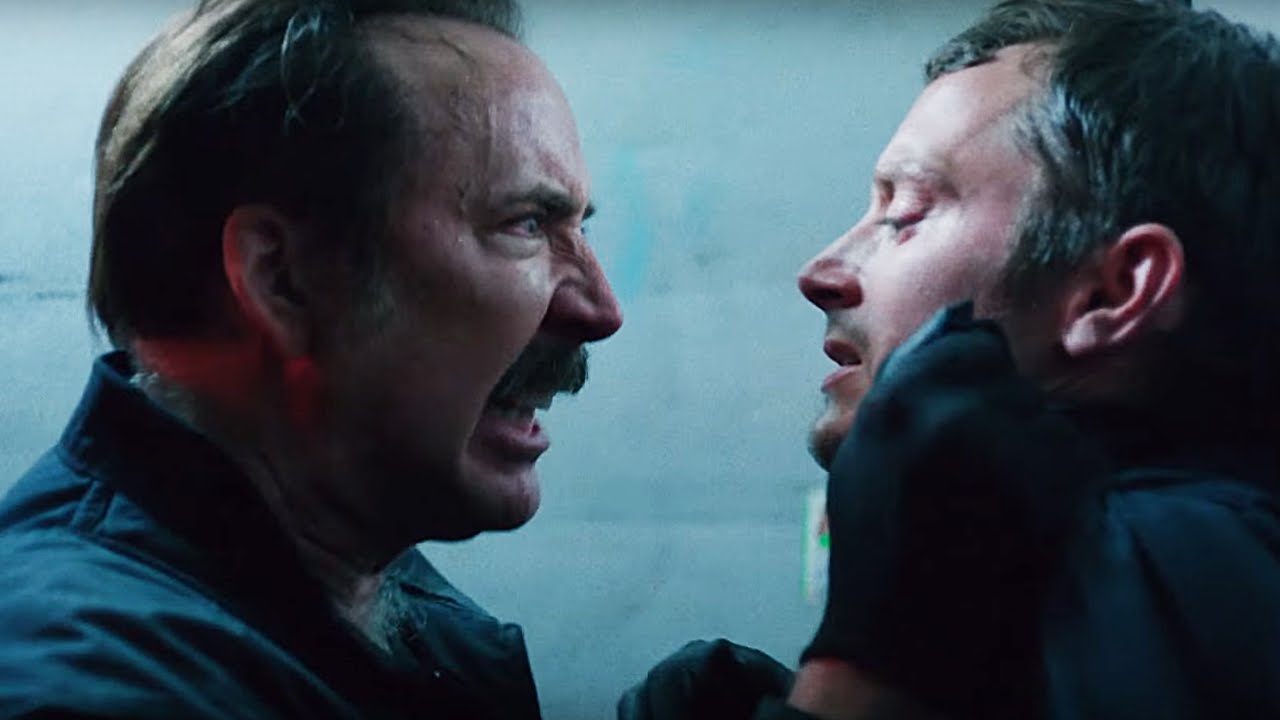5. Snake Eyes (1998)

Admittedly, Snake Eyes is not a great film. It feels incomplete, underdeveloped, and anticlimactic (which could have to do with a very stale and flat climactic sequence that was the result of a producer-demanded reshoot). However, the film does manage to fall into the “beautiful mess” category, largely due to some fantastic individual set pieces from maestro director Brian De Palma, but mainly due to Cage’s super-charged performance.
In the film, Cage plays a corrupt Atlantic City police detective named Rick Santoro who gets caught up in a complicated and high-reaching murder conspiracy while attending a boxing match. Cage’s fast-talking, ultra-sleazy portrayal of Santoro should have entered the iconic, testosterone-frenzied league of Denzel Washington in Training Day or Al Pacino in Scarface.
Unfortunately, it remains a largely overlooked performance to this day, probably due to the fact that the film itself, while well worth any afficionado’s time, is an inherently flawed one that misses its mark by a small but noticeable distance.
4. The Frozen Ground (2014)

As Nicolas Cage ages, he’s able to achieve normalcy onscreen with much more ease than he ever could in his twenties or thirties (it never appeared to be an easy task for him). Before that, it was hard to take him seriously in anything where he wasn’t highly demented, deeply damaged, or completely oddball. A focused quietness that somehow (and indescribably) still utilizes his individualistic acting method started with The Weather Man and then perfected itself in The Frozen Ground.
Once again, and quite unfortunately, no one saw it because the performance is, like Snake Eyes, housed in a film that doesn’t quite live up to Cage’s work.
The Frozen Ground is a very good and earnest film that depicts the true story manhunt of an Alaskan serial killer (another great and underappreciated performance by John Cusack) lead by Cage’s straight-arrowed and sincerely caring state trooper character. In the film, Cage exudes an integrity, empathy, and focus that reads beautifully, and more effortlessly, than ever before onscreen.
The film itself doesn’t quite reach greatness, as it’s tone is sometimes flat, some of its oversimplifications dumb it down, and it’s ending doesn’t quite resonate with a satisfyingly executed climax. It would be a wonderful made- for-television movie, but is a flawed (though highly worthwhile) effort as a feature film. It just happens to exhibit some fantastic performances, namely one of the best of Nicolas Cage’s career.
3. Joe (2014)

Joe is something of a head-scratcher. Not the film itself, just the fact that, in spite of getting numerous positive reviews upon its recent release, it seemed to disappear shortly thereafter without any form of a following from critics or audiences.
Along with director David Gordon Green, source novelist Larry Brown, and screenwriter Gary Hawkins, Cage created a complex and conflicted character seeking redemption and solace from a violent past while still trying to maintain control over his demons in the present day.
Set in the rural south, Cage’s character is an ex-con who befriends a fifteen-year-old boy, then is faced with controlling his violent impulses when he discovers the abusive situation the boy is living in with his alcoholic father.
The anger in Cage’s character rises throughout the film, and the building tension that results is expertly thought-out and executed by both Cage and Green. Cage’s minute nuances of the character’s increasingly-burning rage is a detailed work of craftsmanship, and it is executed with a subtlety and maturity that that is ever-increasing in some of Cage’s most recent work.
2. The Trust (2016)

The Trust is already a great lost movie of the year 2016. It hasn’t received much notice, and what it has gotten hasn’t been overwhelmingly positive (with a few exceptions).
Written off as yet another generic actioner, The Trust is actually a very clever and darkly comedic modern-day noir crime thriller with two fantastic, fun, and highly committed lead performances from Nicolas Cage and Elijah Wood. It’s also one of the best movies of the year, and features Cage’s best and most daring onscreen work since 2009’s Bad Lieutenant: Port Call of New Orleans.
The least said about Cage’s character, the better, but it’s easily one of his most detailed, complex, and most committed performances to date. Playing a police officer who coerces another officer (Wood) into a high-risk heist scheme, Cage’s character first comes off as a vanilla everyman who resembles a well-intentioned suburban dad more than a burnt out and corrupt cop.
Cage has never been better in creating brilliant comedy through bizarre behavior, intricate mannerisms, and personalized line readings (“I have an idea… It’s a bit wacky” now may very well be the best one of his career).
As the Trust unravels, however, the layers to Cage’s character are exposed, and the film’s tone shifts right along him. He starts off appearing as a middle-aged dork, then turns into a man much more aware of himself than he lets on. In the end, he is revealed to be much more sad and sympathetic than we knew, but also horrifyingly sociopathic in his scheme to get out of a desperate situation.
The Trust is a fantastic movie with a classic Nicolas Cage performance that deserves a much better reception than the one it’s received so far.
1. Vampire’s Kiss (1988)

Many people know about Vampire’s Kiss. For the longest time, it was primarily known as “that movie where Nicolas Cage eats a live cockroach.” More recently, it’s become known for providing some of the most bizarre and outrageous clips to the popular Youtube sensation, “Nicolas Cage Loses His Shit.”
Very few people have actually seen the movie, however. Even fewer have been able to appreciate just what it is that Cage accomplished in the film. Vampire’s Kiss has long been written off as a silly low budget vampire comedy (largely resulting from horrible and misleading promotional art). Artistically speaking, however, it was arguably the biggest turning point of Cage’s career and probably remains, to date, the boldest and most creative performance on his resume.
In the film, Cage plays Peter Loew, a New York yuppie who works in a publishing firm, shifting aimlessly from one woman to another night after night, and who’s only fulfillment in life seems to come from bullying and degrading his defenseless secretary. When Loew is randomly bitten by a bat one evening, he quickly becomes convinced that he is becoming a vampire.
Needless to say, the role is a perfect fit for Nicolas Cage, especially at the point in his career that it arrived. Cage was young, experienced enough to have a grasp on his process, but still fearless and fresh enough in his approach to experiment freely, wildly, and madly. Cage’s performance is a constantly tonally-shifting, surreal, hilarious, horrifying, and ultimately tragic descent into madness.
From the choreographed flamboyancy of his mannerisms to the Katherine Hepburn-ish inflections in his nasally-adjusted voice, Vampire’s Kiss is the Cagiest Nicolas Cage performance we’ll most likely ever get. It evokes the work of silent film actors like Lon Chaney and Max Schreck, while adding in dashes of broad physical comedy inspired by Jerry Lewis and dramatic intensity that could intimidate Brando in his prime.
Peter Loew is still waiting to become a classic character, as Cage’s portrayal of him in Vampire’s Kiss, when viewed from a certain angle, transcends being a performance and is, in and of itself, a highly ingenius work of art.